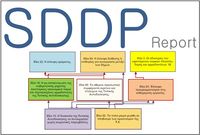|
Executive Summary
This interactive workshop based on the Structured Dialogic Design Process (SDDP) was organised
as part of the project “Uniting for Citizenship and participation: Youth promoting Vulnerable group’s
Rights, Opportunities and Knowledge (UCYVROK)”. The main aim of this project is to inform and
mobilise young individuals from less privileged groups and actively promote youth citizenship. The
project also aims at promoting feelings of solidarity, communication and understanding among
youths of Europe and together work towards promoting European cooperation. The project engages
stakeholders to exchange expertise and share best practices of youth organisations working on issues
of cultural diversity, human rights, inclusion, empowerment and active citizenship. The main
goal is to develop a joint vision of European Youth based on generally abiding principles of human
rights, inclusion and cultural diversity. The project team will also develop a Joint Action Plan encouraging
increased participation of less privileged youth in European led activities.
The Triggering Question (TQ2) was:
What are obstacles that prevent us from reaching our ideal society that is culturally diverse and
inclusive?
Having classified all factors according to the clusters, all participants voted for their five most favourable factors. As in the first phase of the workshop, the votes were widely spread among most of the factors.
The voting results were used to select the most influential factors for the subsequent structuring process. The participants managed to structure 20 factors that received one or more votes and were selected important according to their interrelations.
The pattern of influence created shows the root causes hindering the materialization of the ideal multicultural society. The influence map consists of five different levels of influence.
The ideas which received one or more votes and were structured to create the influence MAP shown below:
The factors that received most votes were:
- Weak civil society;
- Lack of appropriate training for teachers;
- Traditional education system does not have a strong connection to reallife;
- Corruption and personal interests of political leaders;
- No citizenship education in schools;
Participants
| Name | Country |
|---|---|
| Andrzej Szozda | Poland |
| Piotv Olsolzki | Poland |
| Oana Nestian | Romania |
| Daniela Craciun | Romania |
| Paulina Vitovicova | Slovakia |
| Marta Hanecakova | Slovakia |
| Zsofia Szalai | Hungary |
| Kinga Szebegynszki | Hungary |
| Santa Grinberga | Latvia |
| Svetozar Daskalov | Bulgaria |
| Tsena Zhelyazkova | Bulgaria |
